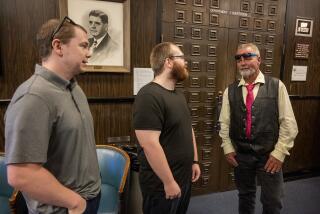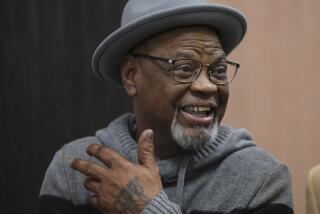Father in Prison for Poisonings Is Freed
ARCADIA, Fla. — A circuit judge Tuesday overturned the murder conviction of a man who spent 21 years in a Florida prison in the poisoning deaths of his seven children in 1967.
Retired Circuit Judge Clifton Kelly ordered James Richardson, 53, immediately released to the custody of defense attorney Ellis Rubin of Miami following an extraordinary appeal in which both Rubin and special prosecutor Janet Reno argued that Richardson had been railroaded.
Richardson could be tried again for first-degree murder, but Reno said the state planned to drop the charges within about 10 days.
A white jury in 1968 convicted Richardson, who is black, of poisoning his oldest child, an 8-year-old girl, and he was sentenced to death. The sentence was later commuted to life imprisonment. The seven children died after eating food laced with parathion, a deadly insecticide that later was banned.
“This court is now convinced that the defendant did not receive a fair trial,” Kelly told a packed courtroom in the DeSoto County Courthouse.
“There is a definite possibility of a different outcome in the trial of James Richardson” if material that should have been available to the defense had been provided by the prosecution, he said.
Richardson, a former migrant farm worker, was whisked out of the courthouse and into a car driven by a sheriff’s department employee. “Within my heart, I knew that these great men were going to get me out--they weren’t going to let me stay in there,” Richardson said.
Richardson’s wife, Annie Mae, cried when she heard the judge’s decision. She raised her arms to heaven and said, “Thank you! Thank you!”
Gov. Bob Martinez, who had appointed the special prosecutor to review the case, said the evidence presented justified Richardson’s release.
“Mr. Richardson has lost too many years of his life in prison, but my hope is that this decision will give him an opportunity to rebuild,” he said.
Kelly spent the day listening to arguments from three sides: Richardson’s attorneys, the prosecutor who brought the 1968 case and the special prosecutor. He deliberated about 30 minutes before making his ruling.
Frank Schaub, the recently retired prosecutor who tried Richardson, denied any wrongdoing and described himself as “the last remaining protector of the rights of these poor, young, defenseless children.”
Defense attorney Mark Lane argued that the state attorney and the DeSoto County sheriff at the time of the trial railroaded Richardson by manufacturing and encouraging false testimony and by withholding essential evidence from the defense. Lane, a Washington, D.C., lawyer and author, first alleged a frame-up in his 1971 book, “Arcadia.”
Prosecutors argued during Richardson’s trial that he poisoned the children in order to collect on a $1,000 insurance policy he allegedly had taken out on each of them.
But Reno, the special prosecutor appointed by Martinez, told Kelly that Richardson had received only a business card from an agent with whom he had discussed insurance coverage, and had not paid any premiums or obtained any policy.
At one point, Lane charged that then-Sheriff Frank Cline was friendly with Bessie Reese, the baby-sitter who at first was suspected in the poisonings, and that he had lied to protect her.
Reese, now in her late 60s and in a nursing home, has confessed to nurses about the 1967 deaths, according to an affidavit from the nurses. Reese has not been charged, and prosecutors have said that she has become confused.
More to Read
Sign up for Essential California
The most important California stories and recommendations in your inbox every morning.
You may occasionally receive promotional content from the Los Angeles Times.










